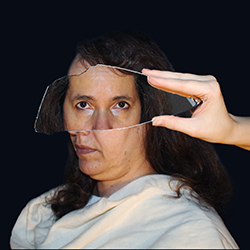The Women of Lockerbie – Washers of Souls

Rich insights into the power of love, courage and ritual in the face of great trauma are at the heart of this drama. Its message of compassion resonates both with classical tragedies and with our own contemporary anxieties about terrorism. It is timelessly relevant.
The play is set in the Scottish countryside, beside a stream, seven years after the 1988 bombing of Pan Am 103 in which 270 people died. Grieving the loss of their own family members, and suffering from the trauma of witnessing body parts, metal fragments, and bodies still strapped to their seats falling from the sky into their homes, golf courses, and gardens, a small group of Scottish women help each other and relatives of passengers to address their shared grief and anger.
Key to their spiritual coping is the understanding that objects associated with the dead have a sacred quality, and a special potency for healing. In Lockerbie, the sacred objects were the 11,000 articles of clothing and personal effects recovered from the wreckage and stored—soiled and contaminated with blood and guts—in a warehouse for years pending the end of the criminal investigation into the bombing.
First confronting, then working with officials responsible for investigating the bombing, the women come to appreciate that identifying and laundering items of victims’ clothing recovered from the wreckage and returning them to the families that want them, is a ritual of immense kindness. Washing clothes has never been a more potent act of redemption than in this play. In their interdependence, these friends, these women of Lockerbie, are called to acts of love, and the men assembled gladly follow them.
Lock and Key Theatre from Surrey, BC, offers a strong ensemble cast that never flags in this production. Sue Backs as Olive Addison, a key organizer of the Scottish women, and Jennifer Kennedy as Hattie, the clever cleaning woman inside the bureaucracy, show some of the special drive and skills that are necessary for overcoming resistance. Alaina Holland as Madeline Livingston, and Paul Beckett as Bill Livingstone, American parents of one of the victims, play their roles well as troubled outsiders who come to understand that they are not outsiders after all. Bill’s role is that of a thoughtful male supporter who serves as an influencer of George Jones, the US official with an agenda of efficiency, played by Stephen Elcheshen. The supporting actors, Nikki Bryce and Tina Teeninga, also evoke convincingly what they are called upon to evoke—the diverse forms that compassionate support takes. In the end, there is listening, and compassion all round, and a great deal of healing.
The Women of Lockerbie is well-conceived, well-written and well-performed under the direction of Kate Muchmore Woo. Most important, it reveals and celebrates the timeless value of love in the face of terrible trauma and suffering.
http://www.deborahbrevoort.com/plays/the-women-of-lockerbie/



